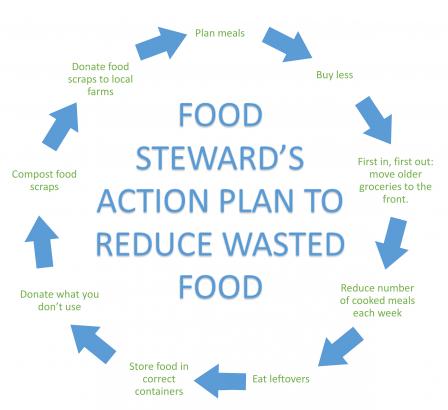Pledge Action Steps
Faith communities are stewardship leaders tackling so many issues impacting human health. Many congregations are already reducing wasted food and feeding people as part of their overall stewardship mission. Take EPA’s Food Steward’s Pledge and commit to reduce wasted food and hunger. You can also get simple tools to help tackle this issue, technical support and recognition for your success.
Take the pledge to:

- Learn about:
- To learn about actions you can take to reduce wasted food, visit the Sustainable Management of Food website.
- To learn about actions you can take to reduce wasted food, visit the Sustainable Management of Food website.
- Sign-up to take the Food Steward's Pledge:
- Religious denominations, their member congregations, interfaith and community groups can Take the Food Steward’s Pledge.
- Religious denominations, their member congregations, interfaith and community groups can Take the Food Steward’s Pledge.
- Take action:
- Modify Food Purchases – Determine how much food is actually needed. Buying less food means wasting less food. Be mindful of the ingredients and leftovers you have on hand before going to the market. You will waste less and may even find a new dish in the process.
- Donate – Donation not only keeps wholesome food out of landfills, it also feeds those who need it most. According to the U.S. Department of Agriculture, about 49 million people in the United States do not have access to enough food for an active, healthy life at all times; think about donating extra food to shelters or food banks or using donated food to feed your congregation.
- Compost – Not all food waste is edible, however food scraps and spoiled food do not belong in the landfill. Find community gardens or start your own composting site. It’s easy, check out how to start a composting site. Adding compost to your soil improves its structure, helps it absorb and hold moisture, supplies slow-release nutrients to plants and reduces erosion. An integral part of sustainable gardening, composting helps you create a vibrant, healthy and beautiful garden while conserving water and energy and reducing pollution and waste.
- Get others involved:
- Whether it’s moldy cheese, limp celery or left overs in the back of the fridge, chances are you’re not alone in wasting food. Wasted food is a problem with profound financial and environmental impacts. After taking the Food Steward’s Pledge, talk about the work you’re doing with your community. Friends, family, local businesses and congregations can all take steps to reduce wasted food. Encourage businesses in your community to join EPA’s Food Recovery Challenge.
- Whether it’s moldy cheese, limp celery or left overs in the back of the fridge, chances are you’re not alone in wasting food. Wasted food is a problem with profound financial and environmental impacts. After taking the Food Steward’s Pledge, talk about the work you’re doing with your community. Friends, family, local businesses and congregations can all take steps to reduce wasted food. Encourage businesses in your community to join EPA’s Food Recovery Challenge.
- Share your story:
- EPA wants to hear from you. Your success stories can educate and inspire others to take action. Share your story on the actions you are taking to reduce wasted food in your community. Email us at epafoodsteward@epa.gov and use #FoodSteward.
